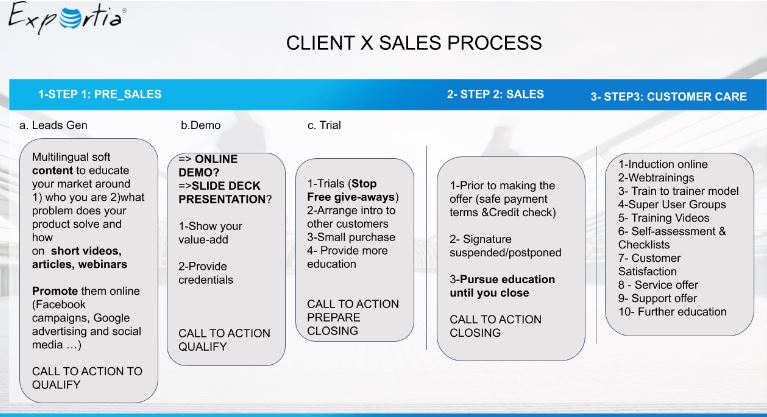Why this is the perfect timing to refine your sales process in order to generate leads, close sales, leverage and retain long-term European customers in this pandemic
There has not been a better time to sell smarter! This is my conclusion from the last months of being grounded in Australia and having my European team in lock-down for a couple of months, instead of visiting key European customers and partners throughout Europe.
Despite the economic slowdown, we have continued to generate leads, to secure new European distributors, to onboard new sales team members, and to train new end-users on behalf of our Australian customers, mainly innovative technologies developers and manufacturers. All of that has been done with no face to face contact in the last few months.
And while working hard to create and maintain momentum with European customers on behalf of these Australian innovative Small and Medium Sized businesses, I have come to the following conclusion :
Australian SMEs need to focus on refining their sales process to scale their business internationally in the current pandemic.
Particularly in the high-technology sectors we work in, the sales process always looks like this: 1) There is a pre-sales stage which includes some lead generation activities, a demonstration of the solution, and then the opportunity for the prospective customer to test the product. 2) Once the test or some sort of trial period has concluded successfully, then it’s time to close the sale. 3) The last step of the usual sales process after-sales care or customer care. This usually involves an education piece.
Now during this semi-lockdown period, how can we adapt this sales process to maximise impact while having limited face to face?
Let’s start with pre-sales.
At the start, there is always a lead generation campaign. Over the years, we successfully generated hundreds of leads with trade shows and conferences, now in COVID-19 times we don’t contemplate to send anyone to a conference or a trade show before 2021. Needless to say, we are not going to wait for 2021 to start generating leads!
The way we have tackled this issue is through the production of educational pieces. There are smart and interactive ways to introduce who you are and what problem your technology solves. Simple things have worked extremely well. We have produced short pieces of content for a very targeted and qualified audience in a series of e-mails. Being targeted to key European target customers we of course translated our pieces of content into the different languages. We produced introductory videos in different languages to present a product or technology.
We also wrote articles that we shared with a captive audience. All these pieces of content were then promoted via email, as well as Facebook, and linked-in campaigns.
Once we got traction, we were able to schedule web demonstrations. That was easy enough. Sometimes, for very technical products (imagine a piece of machinery) a web demo was not possible. In that case, we share video demos and technical calls. During the demonstrations or the technical calls, it’s important to position your business well in a nice slide deck and present well during a web demo (nice background and banners can be used). Providing the right set of credentials with customer references is a good way to build your credibility. Remember we don’t have any face to face contact, therefore these customer testimonials and case studies are critical to building credibility. You have to showcase your value adds and current customers’ experiences are really important for that.
Once you have done the demo and triggered their interest. It time to secure a way for them to test your product or solution. In IT, this is easy. You can set-up a trial period. When you have physical products, the easy part is to give a free sample. In COVID-19 times, I have encouraged my customers to stop giving away free stuff. We are in uncertain times, and we can not afford to invest time and effort in potential customers that are not going to buy anyway. The best way to know is to make them commit. If this is possible in your line of business, I would at a minimum make them pay for the shipping costs of samples or even better push them for a small sale to start with. You may want to be flexible on your minimum order quantity for example to get first trial sales. This trial period needs to be looked after. It’s important to set the scene, provide the appropriate training, hold your new potential customer’s hands to maximise your chances of getting the sales at the end of the trial.
What happens at the sales stage
Once you have conducted a successful trial period, it is time to close the sale. COVID-19 has created some economic constraints and some European businesses are suffering financially. Therefore, I recommend re-evaluating your terms and conditions. Push for payment in advance as hard as you can. People understand it might be a new requirement. It might also be the time to conduct systematic credit checks as well and have this procedure integrated into your process if it is not already there.
And after-sales?
After-sales is where the big and recurring business is generated. There’s nothing worse than shipping a product or installing a cloud-system and letting the customer work it out for themselves. I guarantee that you may have generated one first sale but there won’t be any recurring business. The after-sales is almost as important as the sale itself. We like to call it customer care. This step in your sales process would traditionally involve face-to-face onboarding, training perhaps, some kind of technical support. These actions have now to be delivered preferably online. Can this be done in your business? How are you going to train your end-users to use your product or implement your software without any of your team members being physically present? That’s the challenge.
This pushes our small businesses to move to online e-learning and video-training. It requires to create the educational pieces that facilitate the on-boarding process of a new customer. There are so many different ways to make a customer comfortable in using your product. There are demonstration videos you can shoot. There are cheat sheets, checklists, and ‘how’ to images you can create. There are surveys and questionnaires you can create to make sure a skill has been acquired. This on-boarding and training phase is crucial right at the moment to secure your European customers long term.
Besides, this is also the opportunity to create a support service that can be delivered remotely on the phone, via email, or via video conferencing. It will enable you to ensure long-term customer satisfaction even if your team is in lockdown or your customer has limited access to its site. Some of my customers manufacturing machinery, electronic devices are now able to provide remote support services thanks to embedded bluetooth capabilities. That definitely becomes a very useful feature in the current times.
Here is a recap on the main points to consider if you want to bullet-proof your sales process for international sales in the current pandemic climate.

If you have any question on how to best support your European customers from Australia, or are looking at generating more leads in Europe, contact us to see how our Europe-based sales team can help you out.
About Christelle:

Christelle turned her back to a successful career as a sales representative in the corporate world in Europe. When she moved to Australia in 2006, she started Exportia to share the wealth of her Europe-wide sales experiences for a small business as an export manager and as a sales representative at IBM in Paris.
“Having taken dozens of Australian businesses to Europe, I personally know the difficulty for a small business to significantly grow their sales in the European market. It is a very diverse market and small businesses often don’t know where to start. Small business owners are often caught up with running their business and with their domestic market to be able to allocate enough time to the European market. Lowering the risk for small businesses and guiding them to maximise the export sales results are what drives us at Exportia.”
Christelle has also encapsulated her learning into a book called “Ready Tech Go! – A definitive guide to exporting Australian technology to Europe”. French native speaker, fluent in German and English, with Basic Italian and Hindi.




